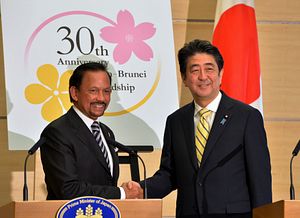Prime Minister Shinzo Abe met with Sultan Hassanal Bolkiah at October’s Japan-Brunei Summit to discuss energy cooperation and the development of renewable energy in Brunei. Japan is already the largest importer of Bruneian LNG – do you expect this relationship to continue?
Prime Minister Shinzo Abe and Sultan Hassanal Bolikah held three bilateral meetings last year, first in May in Tokyo, then in October in Brunei during the ASEAN-related Summit Meetings, and finally in December in Tokyo, just before the special Summit Meeting commemorating the 40th anniversary of Japan-ASEAN relations. The two leaders discussed a number of issues including our bilateral economic relations.
On energy, they reaffirmed that we will continue to be indispensable partners, as we renewed a long-term liquefied natural gas (LNG) export/import contract in April 2013. Japan remains the biggest export destination for Brunei – and for Japan, Brunei continues to be a stable and reliable supplier of gas. Japanese companies have also been active in investing in Brunei, and are planning new projects in areas such as petrochemicals and halal food in recent years, which is helping Brunei to create jobs and diversify its economy. We also hope to see more cooperation in the field of renewable energy and in energy saving, too.
How does Brunei plan to utilize Japanese “green” technology? Will a push for renewable energy pose a threat to Brunei’s reliance on the export of fossil fuels?
Oil and gas will remain an indispensable energy source for quite some time, but its availability is limited. The more you diversify through renewable energy, and the more you use energy-saving technology, you will be able to conserve fossil fuels for future use, and reduce greenhouse gases in the short run. This is also for the benefit to fossil fuel exporters like Brunei. As Japanese companies have considerable know-how on so-called green technology, we hope that they can contribute to Brunei in these areas too.
Is there room for growth in sectors not related to energy?
I think there is, particularly by widening the private sector, and aiming at the integrating market of the whole ASEAN planned after 2015. For that, one has to find sectors where Brunei can have a comparative advantage over other economies.
Japan and Brunei are both engaged in territorial disputes with China. Does Japan support Brunei’s claims?
We are not supporting each other in terms of territorial claims. But there was discussion during last year’s ASEAN-related meetings and East Asia Summit about the need to respect the freedom of navigation and flights and to resolve disputes peacefully based on international laws in the South China Sea.
Brunei was the ASEAN Chair in 2013. What were some of the country’s most noteworthy achievements?
Brunei was an extraordinarily efficient organizer of hundreds of meetings and a very skillful Chair of ASEAN during 2013. Consensus among ASEAN countries and its dialogue partners were achieved even on sensitive issues such as the South China Sea, thanks to many visits and consultations by His Majesty the Sultan and his ministers. It laid the foundation for advancing ASEAN integration by 2015, and initiated important discussions in the East Asian Summit framework too.
Another achievement for Brunei’s chairmanship was the celebration of the 40th Anniversary of the ASEAN-Japan Friendship and Cooperation. Throughout the process of preparation of the ASEAN-Japan Commemorative Summit Meeting which was held last December in Tokyo, and co-chaired by Prime Minister Abe and His Majesty the Sultan, Brunei offered important contribution in formulating a vision of future Japan-ASEAN relations. The results were compiled in a Vision Statement on ASEAN-Japan Friendship and Cooperation, and a Joint Statement entitled “Hand in hand, facing regional and global challenges.”
2014 will mark the 30th anniversary of diplomatic relations between Japan and Brunei. How has each country benefited from this relationship?
Throughout the past 30 years, Japan and Brunei enjoyed very good relations not only in terms of economy, but also in terms of political relations and cultural and youth exchanges. This year also underscored the importance of Brunei as key member of ASEAN, an increasingly prominent regional entity. Since 2014 marks the 30th Anniversary of Japan-Brunei Diplomatic relations, we plan to celebrate it through various events and increased exchanges in various fields, both in Japan and in Brunei.
In order to bring additional excitement to the anniversary, an official logo was created and officially announced by Prime Minister Abe and His Majesty the Sultan during the Joint Press Conference after the Japan-Brunei Summit Meeting on December 13. The logo will be used in Japan and Brunei at events related to the 30th Anniversary.
To commemorate the anniversary, the Embassy of Japan in Brunei is planning to organize many events, starting with an exhibition titled Sharaku Interpreted by Japan’s Contemporary Artists at the Royal Wharf Art Gallery that will run until January 25. That will be followed by a concert showcasing traditional Japanese instruments and duo musicians on February 7 and 8, as well as a Japan Festival in March and many other events to come.
Will the adoption of Sharia law affect Japanese tourism to Brunei?
Brunei has announced that it will be implementing the Sharia Criminal Law from April this year. Now we are waiting to see the details on how it will be implemented, since some of these clauses seem to apply to non-Bruneians too. We hope that it will not affect exchanges of people and economic activities between Japan and Brunei.

































